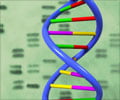A transcriptional biomarker for Huntington’s disease that assist in the monitoring of disease activity and in the evaluation of new medications has been identified by researchers

They found that individuals with Huntington's disease overexpressed the gene, H2AFY, in their blood. The overexpression of this gene in both the blood and the brain was validated in blood samples from clinical studies involving 142 participants -- including individuals with HD, some who were genetically destined to develop the disorder, and healthy controls -- and postmortem autopsy samples from 12 individuals (including HD patients). Specifically, the research demonstrates a 1.6-fold over-expression of H2AFY in patients with Huntington's disease. "We know how to diagnose HD. What we don't have, however, is a simple test to tell us whether the disease is active and progressing or responding to new medications. Such a test would be critical for making clinical trials more efficient.
We are excited about the potential of our discovery" said Scherzer, who is also an assistant professor of Neurology at Harvard Medical School. "The next challenge will be to develop this prototype biomarker into a test that is useful in drug trials."To begin to evaluate the potential role H2AFY may play in monitoring the effectiveness of neuroprotective therapies, the researchers conducted experiments using genetic mouse models of Huntington's disease which were also discovered to over express H2AFY. They found that animals receiving the neuroprotective drug sodium phenylbutyrate for two weeks had reduced expression of that gene in key areas of the brain.
The investigators also tested human blood samples from a multicenter phase II clinical trial of sodium phenylbutyrate conducted by Dr. Hersch and the Huntington Study Group and found that the expression of H2AFY was diminished in participants who received the drug. "Our findings, taken along with previous research, suggest that Huntington's disease progression and patient responses to some treatments could be measured by a blood test and that this biomarker gene, H2AFY, could help to facilitate research into the effectiveness of potential treatments for this disease," said Hersch, who is also a professor of Neurology at Harvard Medical School. "Even in very large studies lasting years, it is very difficult to use clinical measures to find evidence that a treatment might slow down Huntington's disease. Biomarkers like H2AFY can help considerably."
Source-Eurekalert










